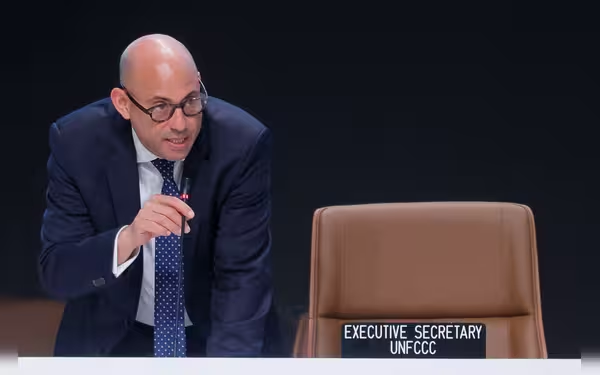Sunday, November 24, 2024 08:20 PM
UN Climate Chief Urges Action After COP29 Climate Finance Deal
- COP29 concludes with a contentious climate finance agreement.
- UN Secretary-General calls for urgent climate action.
- Developed nations commit $300 billion annually by 2035.
 Image Credits: arabnewspk
Image Credits: arabnewspkUN climate chief emphasizes urgent action following COP29's climate finance deal, committing $300 billion annually by 2035.
The recent COP29 climate conference held in Baku, Azerbaijan, has concluded with a significant yet contentious climate finance deal. This agreement, reached after two weeks of intense negotiations, aims to address the pressing challenges posed by climate change. However, it has sparked a mix of hope and concern among global leaders and environmental activists alike.
UN Secretary-General Antonio Guterres expressed his disappointment, stating that the deal did not meet the ambitious goals necessary to combat climate change effectively. He emphasized that the agreement should be viewed as a "foundation" for future efforts rather than a final solution. Guterres remarked, "I had hoped for a more ambitious outcome — on both finance and mitigation — to meet the great challenge we face." This sentiment reflects the urgency of the climate crisis and the need for immediate action.
The deal commits developed nations to provide at least $300 billion annually by 2035 to assist developing countries in transitioning to greener economies and preparing for increasingly severe climate-related disasters. This commitment marks a significant increase from the current $100 billion provided by wealthy nations, which is set to expire. The initial proposal was even lower at $250 billion, highlighting the progress made, albeit with room for improvement.
Guterres stressed the importance of honoring this agreement fully and on time, stating, "Commitments must quickly become cash. All countries must come together to ensure the top-end of this new goal is met." This call to action underscores the necessity for nations to not only commit to financial support but also to deliver tangible results.
In addition to financial commitments, Guterres urged countries to present new, comprehensive climate action plans well ahead of COP30, emphasizing the need for urgency in addressing climate change. He stated, "The end of the fossil fuel age is an economic inevitability. New national plans must accelerate the shift, and help to ensure it comes with justice." This highlights the dual challenge of transitioning to sustainable energy while ensuring fairness for all communities affected by these changes.
UN climate chief Simon Stiell echoed Guterres' sentiments, declaring that it was "no time for victory laps" following the agreement. He acknowledged that no country achieved all its goals during the negotiations, indicating that significant work remains ahead. Stiell's statement serves as a reminder that while progress has been made, the journey towards a sustainable future is far from over.
As the world grapples with the realities of climate change, the outcomes of COP29 serve as both a stepping stone and a wake-up call. The commitments made in Baku are crucial, but they must be followed by concrete actions and accountability. The fight against climate change requires collective effort, innovation, and a commitment to justice for all. As we move forward, it is essential for nations to collaborate and build upon this foundation, ensuring that future generations inherit a healthier planet.













